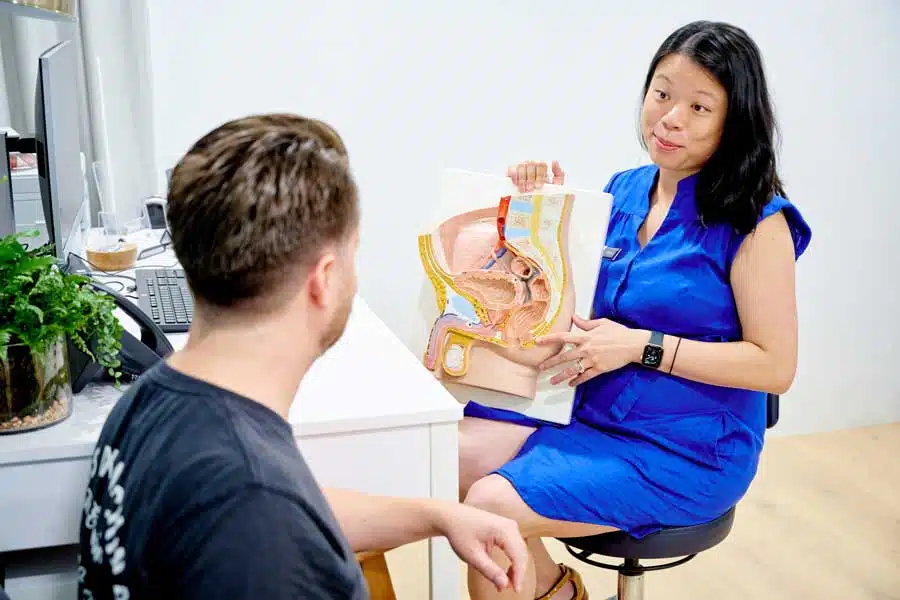Have you ever found yourself experiencing constant urine leakage after using the toilet? Is your urine stream while you use the toilet unusually slow? Does your bladder always feel full, no matter how many times you go to the toilet? If any of these questions resonate, you could be suffering from overflow incontinence, or, urinary retention.
If you do suffer from this condition, you are not alone! Over 5 million Australians experience some kind of bladder or bowel control problem in their lifetime. Dealing with issues like an overactive bladder or bowels can feel embarrassing, which is why over 70% of people do not seek help when they need it.
We’re here to let you know that overflow incontinence is a more common issue than you’d think. And, best of all, there are overflow incontinence treatment options out there that can help you regulate your urine flow, alleviate symptoms, and live a happier, healthier life.
What Is It Like To Live With Overflow Incontinence?
To gain a better understanding of what overflow urinary incontinence is, let’s explore the experience of those who have it. Sudden urinary incontinence can have people reeling, impacting their life in a number of ways.
Consider the story of a once young-at-heart grandmother. She is healthy, active, and loves to play with her grandkids, only to find that one day, overflow urinary incontinence is stopping her in her tracks. She now finds that her bladder always feels full no matter how many times she uses the toilet. While playing with grandkids, or even when she sneezes, she now experiences unexpected urine leakage. She thinks maybe it is just a urinary tract infection, but it never goes away. She is at a loss for what to do.
Or consider a 60-year-old man who suddenly finds himself struggling with bladder control at work. He is otherwise healthy, but experiences urinary leakage that has him taking extra underwear with him when he leaves the house. He is embarrassed by the issue and doesn’t want to buy an incontinence product like adult nappy underwear. He feels shame about it, which prevents him from reaching out to a doctor. He now isolates himself from social gatherings, for fear of experiencing a bladder issue in public.
Issues with urine flow, bladder control, and overflow incontinence symptoms can feel shameful to deal with. Many people believe it is their fault, that there is nothing that can be done to fix it, and they can’t bring it up with a loved one or a doctor. If you relate to the stories above, we’re here to tell you there are things that can be done to address the issue. There are a variety of medical issues that can lead to overflow incontinence, and treatments to help you gain better bladder control.
What Is Overflow Incontinence?
Overflow incontinence is one of many types of incontinence (such as urge incontinence, stress incontinence, mixed incontinence, etc.) that affects a person’s ability to control urinary and bowel functions. Overflow incontinence specifically refers to a person who struggles to completely empty their bladder when they use the toilet, which leads to unexpected urine leakage shortly afterwards.
Overflow incontinence is harmful if left untreated. While many people think bladder leakage is just embarrassing, urine left in the bladder can lead to harmful bacteria growth, which can lead to urinary tract infections or other issues.
What Causes Overflow Incontinence?
Overflow incontinence can develop in a person for a number of reasons. Common ones include:
Enlarged Prostate
Overflow incontinence is often more common in men than women, as one of the primary causes can be an enlarged prostate gland. If a man’s prostate is enlarged, it will block the flow of urine out of the urethra because of the increased pressure.
Urethra Blockages
Blockages in the urethra in the form of swelling, kinks, a urinary tract tumour, prolapse, or bladder stones can also lead to issues with urine flow and overflow incontinence.
Muscle Weakness
Having a weak bladder muscle can impede your body’s ability to successfully cause the bladder contraction needed to begin urinating.
Nerve Damage
Nerve damage can also affect the bladder’s ability to urinate. This can be general nerve damage, or nerve damage as a result of issues including diabetes, Parkinson’s, spina bifida, multiple sclerosis, or alcoholism.
Medications
Medications such as antidepressants or anticonvulsants can impact the body’s nerve signals, leading to overflow incontinence and issues with urinating.
How Is Overflow Incontinence Diagnosed?
Overflow incontinence is diagnosed with physical examinations. These tests can include:
Bladder Stress Test: A doctor will look for issues with bladder control when you cough.
Urinalysis: A urinalysis will be done in a lab to check for high levels of bacteria in the urine, infection, evidence of kidney stones, or other abnormalities.
Ultrasound: An ultrasound can be performed to monitor the kidneys, bladder, and uterus to see how much urine is in your system after you go.
Catheterization: A catheter may be inserted to see if it aids in urine flow, or to measure how much urine remains in the bladder after a patient urinates.
Prostate Exam: A prostate exam may be performed to see signs of an enlarged prostate in men.
Treating Overflow Incontinence
There are steps you and your doctor can take to help treat overflow incontinence.
For men with an enlarged prostate, medication can be used to help relax the gland. In some cases, this can also be addressed with surgery. Women who experience blockages in the urinary tract may also need surgery to remove them. There are also a number of medications that can be prescribed to relax urethra muscles and better allow urine to pass.
Double voiding and urinating multiple times every time you go are common treatment methods. Pelvic floor muscle exercises and physical therapy to improve bladder muscle control/relaxation can also be helpful.
Finally, if these methods do not help, the use of a catheter can be prescribed. A doctor or nurse can teach a person how to self-catheterize when using the toilet, to ensure the bladder completely empties when a person goes.
Reach Out For Help!
If you suffer from overflow incontinence, you don’t have to go through it alone! A qualified pelvic physio clinic can help you identify issues and find solutions to make this condition less of an issue. If you want advice on treating overflow incontinence, you can book an appointment with our team and get started!

